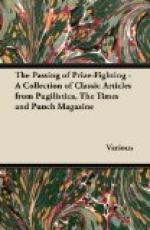Monday, March 5th.—General cheers greeted Mr. CHAMBERLAIN’S announcement that the Government of India had undertaken to pay the interest on a hundred millions of war-debt, but when he proceeded to say that part of the new revenue required would be obtained by an increase in the cotton duties there was a notable cooling of enthusiasm among Members from Lancashire. Mr. RUNCIMAN at once sounded the alarm on behalf of Manchester by asking if there would be a corresponding excise duty on Indian cottons. “All India is against it,” replied Mr. CHAMBERLAIN, who is finding, as his father did before him, how difficult it is to get Englishmen to “think imperially” where their own particular trade is concerned.
There is no doubt that the FOOD CONTROLLER possesses a sense of judicial humour. Complaints have been made of late that while the ordinary British citizen was expected to confine himself to four pounds of bread per week the pampered German prisoner, instead of getting less, was given nearly three times that amount. Lord DEVONPORT has now approved a new dietary scale for prisoners, under which the bread ration will be cut down to sixty-three ounces, or just one ounce less than the allowance of the free and independent Englishman. On the Army Estimates Mr. PRINGLE attacked the Salonika Expedition with a vigour which must have greatly pleased the Bulgar. By a curious lapse of memory, as Mr. CHURCHILL pointed out, he omitted all reference to the position of M. VENIZELOS and our honourable obligations to our Allies.
Mr. CHURCHILL was indeed more statesmanlike than he has been of late, His “amphibious intervention” was on this occasion quite justified. There was good sense in his warning that, while perseverance towards a definite objective was a virtue, “perseverance with an eye on the past” was an equally serious vice; and I hope it signifies a determination on his part not to allow his brilliant future to be all behind him.
Tuesday, March 6th.—Ever since the War began, Mr. SWIFT MACNEILL’S most cherished ambition—second, of course, to his desire to quit Westminster for College Green—has been to get the Dukes of CUMBERLAND and SAXE-COBURG deprived of their British titles. He has worried three successive Governments on the subject, and some time ago received a definite promise that it should be dealt with. A further question regarding it stood in his name to-day, but when he rose to put it Mr. GINNELL squeaked out, “May I ask you, Mr. SPEAKER, what this House has to do with these family matters?” Mr. MACNEILL, of course, like most of his countrymen, has royal blood in his veins, but nevertheless did not seem pleased with the allusion.




